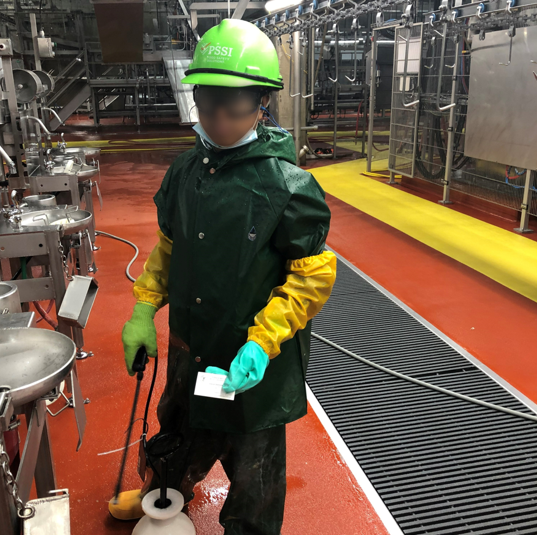Michigan fails again to protect kids from child labor, life imprisonment
A newly released scorecard by the international organization Human Rights Watch has once again deemed that every U.S. state is failing to protect children’s rights — Michigan included.
Though several other states made progress from last year’s report card, Michigan earned an ‘F’ grade again for leaving kids vulnerable to child marriage, hazardous farm work, corporal punishment and life imprisonment.
Out of 12 state laws scrutinized, Michigan lived up to international child protection standards on four of them. “We did the updated scorecard because of the progress,” said Callie King-Guffey, digital communications and advocacy manager with the Campaign for the Fair Sentencing of Youth and the researcher behind the Human Rights Watch scorecard. “And as we were putting together materials for that update, (I was) really reminded of how bad performance is.”
Michigan is almost certain to receive a higher grade on any future scorecard, but how much it rises depends on legislative action in play this session.
Michigan is only 40% compliant — but poised for a big leap
The U.S. is the only member of the United Nations that has not ratified the Convention on the Rights of the Child, the world’s most comprehensive human rights treaty on children’s rights, despite our country taking a leading role in shaping it.
Without ratifying the treaty, issues including child labor and juvenile justice are often the responsibility of individual states.

No state received an ‘A’ or ‘B’ grade on the Human Rights Watch scorecard, which assessed compliance with children’s rights principles set forth in the convention. Seven states earned a C, while more than half of states — 27 — got a ‘D,’ and Michigan joined 15 other states receiving an "F."
In the year since the first report card was released, 11 states improved their grades or rankings by limiting or banning child marriage, raising the minimum age of juvenile jurisdiction, banning juvenile life without parole or banning corporal punishment in private schools.
New Jersey and Minnesota earned the highest raw scores for compliance with the international norms of child protection. Michigan was seventh from the bottom, determined to be 40% compliant.
But changes could come soon.
“It's nearly guaranteed that Michigan is going to be the number 10 state to ban child marriage,” said King-Guffey. Combined with the potential for Michigan to ban the practice of sentencing juveniles to life without parole, she said, “Michigan is in good shape to go from a bottom 10 state to the number three ranked state, which is a massive jump.”
More: Opinion: Child marriage is legal in Michigan. That has to change.
Michigan is a few pen strokes away from a full child marriage ban
Just six years ago, no state had made child marriage illegal, and today only nine states have outlawed it. This year, Sen. Sarah Anthony, D-Lansing; Rep. Kara Hope, D-Holt; and other legislators introduced a package of bills that would fully end child marriage in Michigan.
After passing in the House and Senate, Gov. Gretchen Whitmer in July signed most of the bill package raising the minimum marriage ago to 18 and is due to complete the job any day.
“All I can say is finally,” said Fraidy Reiss, the founder and executive director of Unchained at Last, an organization that tracks and advocates against child marriage. “It will be a very good day for girls and all humans in Michigan when Governor Whitmer signs simple, common-sense legislation that says child marriage is an archaic, sexist practice that needs to end and is ending now.”
Attempts to end child marriage in Michigan failed on three previous attempts, in 2018, 2020 and 2022, but advocates have no reason to doubt the final signatures will be inked presently.
Unchained at Last reports that 5,426 Michigan children were married between 2000 and 2021, some as young as 14 years old. Before passage of this year’s bill package, Michigan had no minimum age on the books.
Nationwide, the number of children entering into marriage has declined sharply, from more than 76,000 in 2000 to just 2,493 in 2018.
Reiss said states won’t get to zero children married without legislative action. “The U.S. State Department calls marriage before 18 a human rights abuse, whether it's happening to one child a year or 10,000 a year or anywhere in between.”
On juvenile justice, ‘We deserve an ‘F’’
For the purposes of the scorecard, Human Rights Watch evaluated states based on the minimum age of juvenile jurisdiction, whether minors are tried as adults and whether juveniles can be sentenced to life without parole.
Civil rights attorney Deborah LaBelle says Michigan’s failing scorecard grade is apt.
“We are still putting children in solitary confinement, still having an extreme racial disparity in treatment of youth, still putting children in adult prisons … We deserve an ‘F.’ We really do.”
More: They thought they’d die in prison. Now they’re juvenile justice advocates on a mission
“We still have juvenile life without parole sentences being imposed and not in exceptional circumstances,” LaBelle said. “The majority of them have been imposed by a total of 10 judges across the state, and it's being imposed disproportionately on kids of color.”
Michigan is the only state in the country that doesn’t have a sentencing commission that could review sentences handed down to juveniles. It also has the largest population of “juvenile lifers” in the nation.

Legislation currently before Michigan lawmakers would end the state’s practice of sentencing children to a lifetime of incarceration without the possibility of parole. But especially in the shadow of trials involving school shooter Ethan Crumbley and his parents, passage of laws removing the option of life without parole for juvenile offenders is far from a sure thing.
“There's been no commitment that they will bring it up for a vote this year,” LaBelle said.
Kids in Michigan can work hazardous jobs during school hours
When it comes to child labor, no state has set the minimum age to work in agriculture at 15 as the Convention on the Rights of the Child sets forth. Michigan has set it at 13 — certainly more restrictive than the 23 states with no age limit at all. But not good enough if you ask Reid Maki, director of child labor advocacy for the National Consumers League and coordinator of the Child Labor Coalition.
“Agriculture is a particularly dangerous sector,” said Maki, who added that although fewer than 6% of working children are employed in agriculture, they account for more than half of child occupational deaths. “We really need Michigan to take a closer look and raise that age to at least 14 as soon as possible and make sure that kids are not in danger on farms.”
The minimum age for hazardous employment is supposed to be 18, according to the International Labor Organization. Yet no U.S. state has mandated that children younger than 18 stay out of dangerous agricultural jobs. In Michigan, 16-year-olds may legally be employed on farms to work with machinery or toxic or explosive materials, and there are no restrictions on when they can perform the work, including during school hours.
Legislation introduced by Reps. Phil Skaggs, D-East Grand Rapids; and Helena Scott, D-Detroit, passed earlier this month was a direct response to reporting on “the widespread, illegal use of child labor in West Michigan and throughout the country,” according to a House Democrats' statement. House Bill 4932 increased the financial penalties companies that unlawfully employ youths must pay for violations, and another bill added fines for employing children who are injured or killed while working during certain hours.
While laws are necessary in protection children’s health, safety and human rights, they don’t prevent children from falling through the cracks. Recent investigations by Reuters, the New York Times and federal government agencies have revealed violations Maki says are likely just the tip of the iceberg when it comes to child labor in multiple sectors.
“There are possibly large numbers of kids working in really hazardous conditions that need our protection,” he said.
Jennifer Brookland covers child welfare for the Detroit Free Press in partnership with Report for America. Reach her at jbrookland@freepress.com.
This article originally appeared on Detroit Free Press: Human Rights Watch scores Michigan an F on protecting child rights

